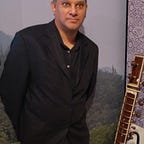Bohemian Travesty
Until his death in 1991, most people did not know, notice or care about Freddie Mercury’s ethnic origin.
This sounds quaint I know. But it really did take obituaries for his Parsi heritage to get much of an airing in the media. His birthname, Farrokh Bulsara, upbringing in Zanzibar and Indian boarding school days were all novel details for a public who only knew him as an iconic rock star.
So, in 1984 when his band inexcusably performed several shows in Sun City, breaking the UN’s cultural boycott of apartheid South Africa, Mercury’s roots weren’t mentioned in the resulting firestorm of criticism.
If anyone was going to care much about him ‘being Indian’ it would have been someone like myself, brown, Bangladeshi born and living in England. I vividly recall my 10-year-old self on Christmas Day 1975 watching Top of the Pops with my parents at the home of close family friends. Our hosts’ children were teenagers so very grown up in my eyes, buying actual records with their pocket money and reading the music weeklies.
All ages were glued to the number one single, ‘Bohemian Rhapsody.’ With its something for everyone sounds and structure, it was already a behemoth. Inevitably it was the ‘Bismallah’ bit that intrigued the room.
I preferred ABBA but listened intently as the teens told their parents knowing the word is Arabic for “in the name of God” helps make sense of the lyric. An adult asked is one of them a Muslim then while another commented they must have traveled or been to university. Good call, but mostly the grownups laughed at the haircuts and loud guitars. As you do.
This memory lingers because they had sensed the word as an echo of places Freddie Mercury was brought up, even though none of us knew it yet. Before Cat became Yusuf and ‘world music’ a brand, ‘Bismallah’ in the chorus was the ‘most Muslim’ part of the rock and roll universe. While it matters little as the band insist, that the song has no tangible meaning, it’s worth noting many of its listeners have so little curiosity they assume the word ‘Bismallah’ to be made up. Indeed, if memory serves, even NME used it as a title for a column about music industry nonsense.
More ironically, many of my parents’ generation of South Asians often claimed Cliff Richard to be one of their own on evidence as vague as that used by the ‘everything is Indian’ character in Goodness Gracious Me. As at least three of his contemporaries in the sixties pop world, Pete Best, Engelbert Humperdink and Peter Sarstedt have better documented Anglo-Indian heritage via mixed-race parents, their fixation on Cliff was always faintly amusing. But once the world knew one of the biggest all-time stars of classic rock ever, was fully Indian all along, this became downright hilarious.
Knowing the above still wouldn’t have made any difference to my teenage self’s reaction on seeing Queen’s oft praised Live Aid set.
Barely a year after their sojourn in Sun City, I could just about acknowledge Mercury’s masterful call and response with the crowd. But all I saw was Nuremberg clap-clap.
For the record, even then, I didn’t regret my only two ever Queen purchases a few years earlier, the Greatest Hits and The Game LPs. They clearly had some memorable songs. I even enjoyed most of the Bohemian Rhapsody bio-pic currently exceeding box office and award expectations.
But the film like the band is reliable only in matching Queen’s ability to give you reasons to dislike them. Even as a curious 12-year-old, I thought the band underappreciated the wit and quality of Mercury’s lyrics for Bicycle Race with a video of topless women riding bicycles. Poor taste it seems is inherent for a band that honours its ‘irreplaceable’ singer by hiring new ones and mistakenly insists on a Greatest Hits volume 3.
As for the film, leave to one side high-profile allegations against its director and let artistic licence overlook its fast and loose chronology. The music and actors are inherently strong enough for it to overcome a painting by number approach to storytelling and band dynamics.
It’s the grandiose myth making and dishonesty that grates.
Queen’s reputation in America was not ‘ruined by puritans’ objecting to the band dressing in drag for their I want to break free video.
The band seem sore that unusually among British bands who had a video banned on MTV in the early eighties, this did not result in an increase in US sales. If the US was so backward about Brits dressing in drag, it wouldn’t have embraced Elton and Bowie in the 70s or made the Rocky Horror Picture Show a lucrative cult hit.
Deliberate effort is needed for a two-hour film about Queen not to mention their breaking of the anti-apartheid boycott. While the film tries to sensitively portray Freddie’s family, its slightly irksome the script seeks out different contexts for characters to call him ‘a Paki.’
The poor taste is poured on fully when the director milks an entirely fictional moment of catharsis by having Mercury rally the band for Live Aid with the cliché of ‘we must do this for starving Africans.’
Not so much real life, more just fantasy, that’s what people want to see.
